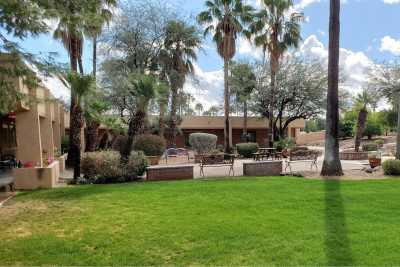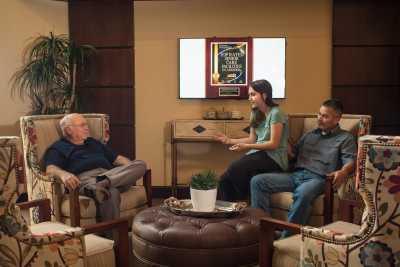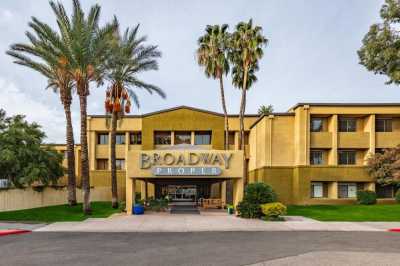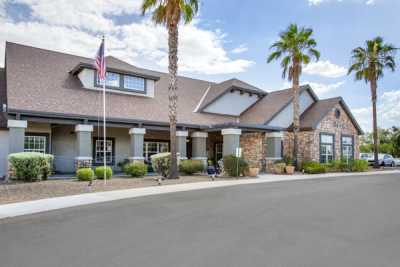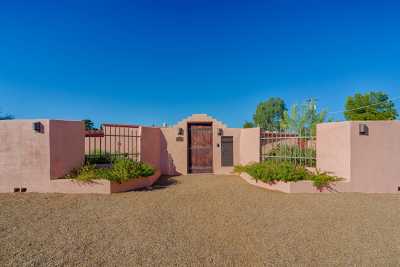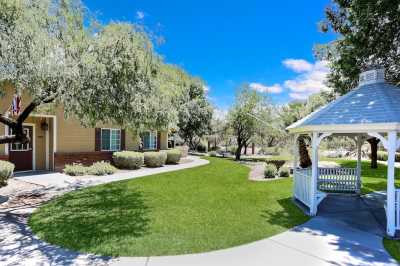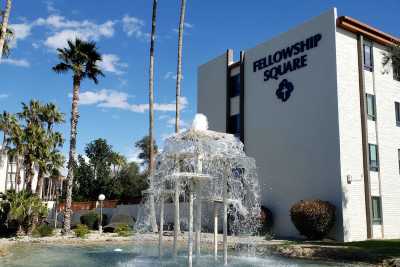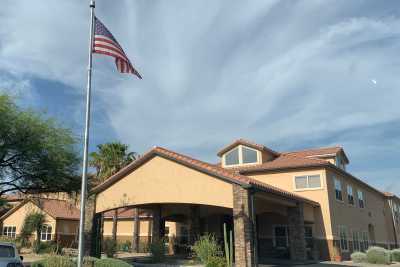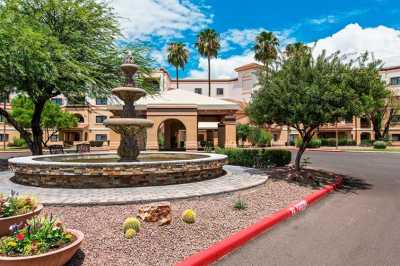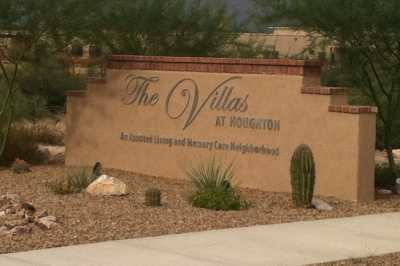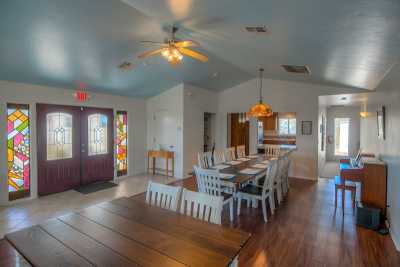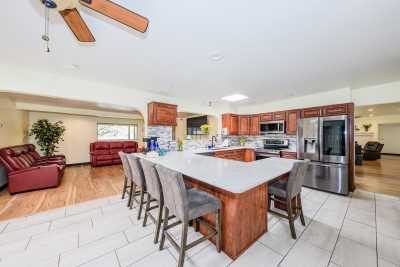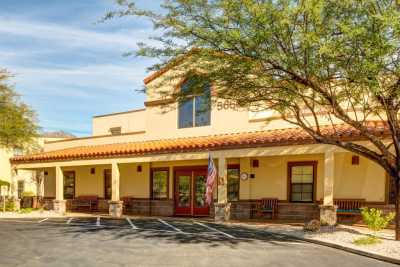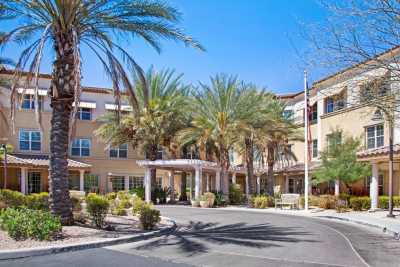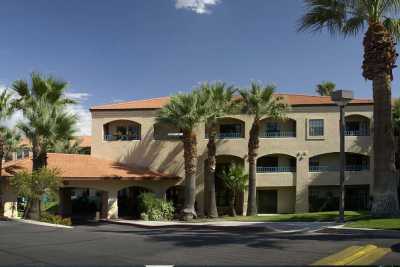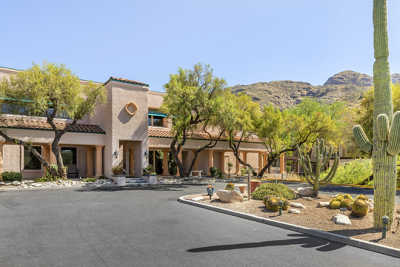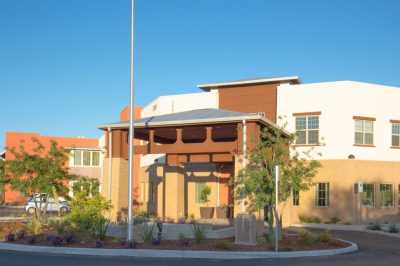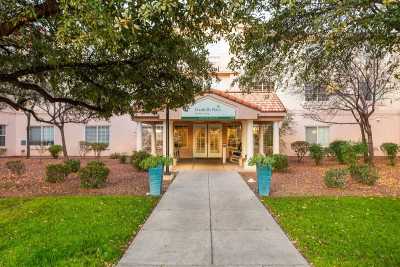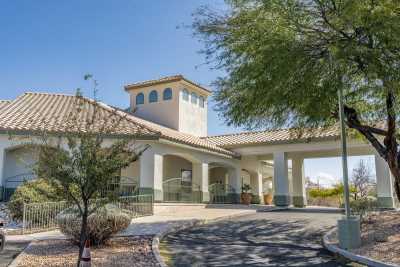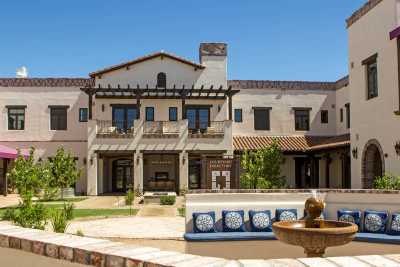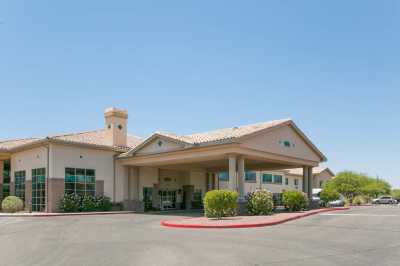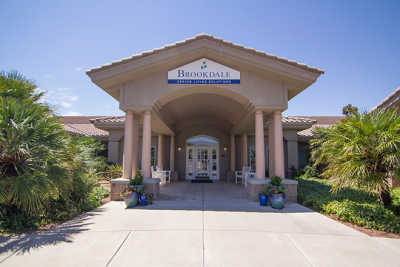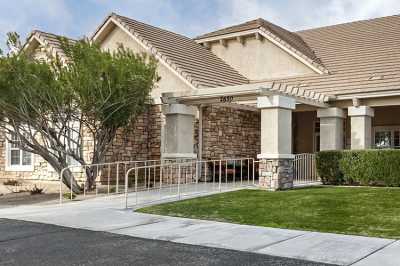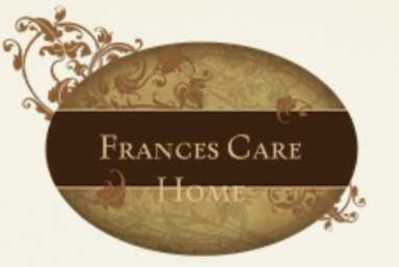
Tucson, Arizona, is a hidden gem for seniors looking to move to assisted living. With a population of just over 500,000, Tucson is only a third of the size of its cousin, Phoenix. More approachable for seniors accustomed to smaller cities, Tucson’s slow-paced sprawl and Old West nostalgia reminds residents of its country foundations. Tucson has many of the same attractions as Phoenix for seniors looking for assisted living: a warm, dry climate and a reasonable cost of living. Tucson, however, has its own flair.
Home to the University of Arizona, Tucson has a balance of youthful energy and historic prestige. Outdoor activities are a popular local pastime, due to the surrounding juxtaposition of dramatic desert and mountain terrain. Because Tucson is at a higher elevation than other Southwestern cities, it enjoys a gentler summer and more greenery than Phoenix.
Perhaps best of all for seniors looking for assisted living, Tucson maintains an even lower cost of living than other cities with comparable scenery, weather, city amenities, and assisted living options. A Place for Mom partners with 31 assisted living communities in Tucson within a 15-mile radius, a high number for a city of its size. Most seniors find an assisted living option in Tucson that fits their needs and budget.
This guide introduces you to the top-rated assisted living communities in Tucson. According to reviews from people like you, these assisted living communities have the best meals and dining, cost-effectiveness, cleanliness, and more. This guide will also highlight what living in Tucson is like, from how far your dollar will get you to local senior resources and senior-friendly activities.
Find Assisted Living Communities Near Tucson, AZ
Tucson, Arizona, is a hidden gem for seniors looking to move to assisted living. With a population of just over 500,000, Tucson is only a third of the size of its cousin, Phoenix. More approachable for seniors accustomed to smaller cities, Tucson’s slow-paced sprawl and Old West nostalgia reminds residents of its country foundations. Tucson has many of the same attractions as Phoenix for seniors looking for assisted living: a warm, dry climate and a reasonable cost of living. Tucson, however, has its own flair.Read more
Home to the University of Arizona, Tucson has a balance of youthful energy and historic prestige. Outdoor activities are a popular local pastime, due to the surrounding juxtaposition of dramatic desert and mountain terrain. Because Tucson is at a higher elevation than other Southwestern cities, it enjoys a gentler summer and more greenery than Phoenix.
Perhaps best of all for seniors looking for assisted living, Tucson maintains an even lower cost of living than other cities with comparable scenery, weather, city amenities, and assisted living options. A Place for Mom partners with 31 assisted living communities in Tucson within a 15-mile radius, a high number for a city of its size. Most seniors find an assisted living option in Tucson that fits their needs and budget.
This guide introduces you to the top-rated assisted living communities in Tucson. According to reviews from people like you, these assisted living communities have the best meals and dining, cost-effectiveness, cleanliness, and more. This guide will also highlight what living in Tucson is like, from how far your dollar will get you to local senior resources and senior-friendly activities.
Tucson Assisted Living Facilities | 585 Reviews
I like the size of this place. It's smaller so it's very friendly and comfortable. My wife has been here for 2 years and particularly enjoys being in the common area and gets a lot of enjoyment from...
We picked this community, because my loved one walked in and it felt homey.They could improve on the cleaning, and housekeeping could be better trained. It's a good place, and my loved one likes it. I would...
When it comes to the activities, I am in independent living and I feel a lot of the activities are assisted living oriented although like chair exercise and yoga and heated swimming pool. The value for cost...

The staff is very friendly to family and guests and greets all residents by first name when passing in the halls. Staff is quick to notice if a resident needs assistance and stays with the resident until...
This is an incredible place for your loved one. wonderful. The staff are exceptional, meals lovely and well prepared. My Mom has been there 9 months and she’s happy and made friends. She enjoys their...
The campus has inviting, secure indoor and outdoor space for memory care residents to occupy. Meals are appealing and provide good nutrition. Daily resident activities are well done and include games, art,...
I would definitely recommend Fellowship Square at Tucson to others. The staff is very friendly. Housekeeping is excellent and is done every 2 weeks. The move in process was very smooth. The meals are good...
They do very good job making sure their client have what they need medically and nutritionally. Also they provide a wide array of activities throughout the day and evening the organization is impressive.
The staff there have been incredibly kind and communicative: including when we first brought my mother-in-law to the community, and it was a struggle on the first day; {name removed] , the head of the memory...
I love it. The community has changed but still happy where I am. All is good or was when [name removed] was there he has been gone for almost 2 years all I know. My husband had wonderful care.
Our free advisors can help
- Compare local facilities
- Determine care type
- Schedule tours
- Evaluate pricing
I am shocked to see a bad review written for Lynda's Courtyard. They are incredible with my mom. She was in a nightmare rehab facility beforehand. Here at Lynda's, it's 10 residents only, ensuring proper...
The friendliness of the staff gets 5+. The home is run smoothly by the staff. The residents eat together if they are able. The food is good and meets the needs of each resident. Maximum capacity is 1. We are...
My mother passed away in March 2022 and my father was depressed and unable to stay in his own home. We moved Dad into Tucson Place, Oct. 2023 and with their help, the transition was very smooth. My father...
My Mother has been living here since August. I love the staff! They are friendly and caring, always smiling. From our very first visit, I noticed how the staff spoke to every single person they came in...
At the time of her departure there appeared to be quite a number of residents leaving. That may have been in part due to atria's increases in cost of services. I did feel it was getting pricey beyond [name...
Park Senior Villa has some of the same issues as most other senior care facilities. All of them see revenue more than people but I do believe Park Senior Villa is unfortunately one of the best in Tucson. I...
I would recommend to others and everyone is very helpful and pleasant. It's a good place to live with fantastic scenery. I picked this community for the activities and it was out of city.
I highly recommend The Ranch Estates of Tucson! Excellent staff! Great food! Caring nurses! Excellent communication! Fun activities!
I think it is a really good mid-sized facility. It is not too big and it is not too small. They have lots of activities going on every afternoon. Mom says they keep them super busy and she is tired by the...
My friend is a vegetarian and they promised to accommodate that but once he moved in grilled cheese was his go to option. After complaining he finally (3 weeks into his stay) met with Asst. Chef and since...
We are so pleased with this community and the care that my mother-in-law is receiving. Her room in the memory care is very nice, spacious and there are currently 10 residents but they are set up for 20. ...
This is a good community and it is a good value. The staff are very friendly and kind. My loved one was in the memory care and is moving over to the unassisted living and is excited to participate in more...
Our families overall experience with Brookdale Tanque Verde has been very good so far in all the categories that are listed. For those who are looking for a community for their loved ones, we would recommend...
We were thrilled to find this facility to accommodate us for a two week respite care term for my mother in Law. [name removed], at Brookdale North showed us the facility and did much to get us in in a...
- Costs of assisted living in the Tucson area
- How people pay for assisted living in Tucson
- Understand Arizona laws and regulations for assisted living facilities
- Get to know assisted living in Tucson
- What to expect from assisted living in Tucson
- Explore senior care with confidence
- Unfamiliar with Tucson? Highlights for seniors
Costs of assisted living in the Tucson area
The figures in the charts below show the average starting costs for assisted living in Tucson before adding extra care and amenity fees. What seniors actually pay for assisted living in Tucson is on average $3,753 a month.[02]. This figure includes all amenities and fees, including rent, meals, and extra costs associated with care services and amenities.
This figure is also reflective of only traditional, larger assisted living communities with over 25 residents. In Tucson, board and care homes make up 31% of the assisted living options, and these average $2,581 a month. While these group homes have fewer amenities since they’re residential homes, they provide the same type of care services as assisted living communities and for a considerably lower cost.
Arizona’s tax laws also make it an attractive state for seniors trying to save in retirement. While it has a higher sales tax, the Grand Canyon State doesn’t tax Social Security benefits or veterans benefits and doesn’t have an inheritance or estate tax. Furthermore, Arizona’s income tax rates, at 2.55% and 2.98%, are low compared to most other states.
Average cost comparisons near Tucson, AZ
Average monthly costs
Tucson, AZ
How people pay for assisted living in Tucson
Seniors and their families usually pay for assisted living with a mix of private and public funds. Because assisted living communities provide a level of care that may qualify for Medicaid, Medicare, or veterans benefits, many families look to use public means to pay for as much of their assisted living expenses as possible and then cover the rest with private funds.
While a retirement account is a common method to pay for life at an assisted living community, it’s certainly not the only way. Long-term care insurance, for instance, may cover some care costs in assisted living, although it may not pay for room and board. Cashing out a life insurance policy is another way to pay for the costs of assisted living. Check with your policy provider to see what is covered under your specific plan. Depending on your family’s resources, the following are other common ways seniors tend to pay for assisted living:
Number of veterans 65+ who live in Tucson, according to the U.S. Census Bureau
43 percent of veterans in Tucson are over 65, according to the U.S. Census Bureau
The Arizona Department of Veterans’ Services offers remote benefits counseling through their Veteran Benefits Counselors (VBCs). These VBCs can identify which benefits you’re eligible for and will help you through the application process. Veterans can set up their virtual appointment by calling 602-535-1215.
The U.S. Department of Veterans Affairs operates the Tucson Vet Center, which offers robust social services at no cost to local Tucson veterans and their families. Veterans and their families can receive counseling services through the Tucson Vet Center, either in-person or through telehealth. Veterans of Foreign Wars (VFW) Post 549 is Tucson’s local chapter of the service organization and is another resource for Tucson’s veteran community. Through VFW Post 549, veterans can get help navigating the VA system, join volunteer groups, and find a community of like-minded people.
Using VA Benefits to pay for assisted living
For eligible veterans, the VA pension and the Aid and Attendance benefit can be used to pay for assisted living costs. The Aid and Attendance benefit is available for seniors who already receive the VA pension, are disabled, and use the VA health care system. The Aid and Attendance benefit is an extra sum added to the VA pension and can be used to pay for anything that improves the veteran’s quality of life, like room and board, care, and amenities at an assisted living community.
To be eligible for the VA pension, a veteran must meet the following criteria:
- Served at least 90 days of active duty, with at least one day of active war-time service
- Be low-income, over 65, or disabled
- Have an honorable discharge
To be eligible for the Aid and Attendance benefit, the veteran must receive a pension and have a war-related disability. A VA health provider determines whether or not the veteran is medically eligible. Eligible veterans must also meet one or more of the following criteria to receive the Aid and Attendance benefit:
- Need assistance with some daily activities, like grooming or dressing
- Have very limited eyesight
- Already reside in a nursing home due to a physical or mental disability
- Be bedbound due to a disability
Tucson veteran resource centers
Applying for benefits can take a long time, but these local and federal resources can help speed up the process and offer peace of mind. Below are some useful resources for veterans looking to apply for benefits to cover some of their assisted living costs. You can access benefits counseling through the Veterans Benefits Counselors (VBCs) from the Arizona Department of Veterans’ Services. The local chapter of Veterans of Foreign Wars (VFW) also offers benefits counseling for veterans and their families. The Tucson Vet Center is your go-to source for mental health counseling.
Resources for Tucson veterans
Arizona Department of Veterans Services
3839 N. Third St.
Phoenix, AZ 85012
Phone: 602-255-3373
Veteran Benefits Counselors (VBCs)
Tucson Vet Center
2525 E. Broadway Blvd., Suite 100
Tucson, AZ 85716
Phone: 520-882-0333
Counseling services
Other services
Veterans of Foreign Wars (VFW) Post 549
8424 Old Spanish Trail
Tucson, AZ 85710
Phone: 520-790-4626
Email: vfwpost549@gmail.com
Assistance
Outreach
Medicaid is a state health insurance program for low-income individuals. Arizona has one of the most organized Medicaid programs in the country. In response to Arizona’s expansion of Medicaid benefits, the U.S. Department of Health and Human Services called it a “groundbreaking effort” in addressing preventable health crises and housing issues.
Arizona’s Medicaid program is called the Arizona Health Care Cost Containment System (or AHCCCS), and provides health insurance without monthly premiums to eligible individuals. To be eligible, an individual must make under the gross monthly income limit — $1,133 for one person and $1,526 for a couple. Local seniors must choose a Medicaid plan available for Pima County residents. Arizona residents can apply on the AHCCCS website. All AHCCCS plans typically cover the following services:
- Specialist care
- Injections and immunizations
- Emergency care
- Chiropractic care
- Prescriptions (unless you already have Medicare)
- Podiatry
- Labs and X-rays
- Dialysis
- Dental, vision, and hearing care
- Hospital care
Choosing a Medicaid plan based on care needs
Seniors in Tucson who want to pay for their assisted living with Medicaid often enroll in the AHCCCS sub-program, Arizona Long Term Care Systems (known as ALTCS) plan. ALTCS tends to cover more services for more people than AHCCCS. It’s designed to cover long-term care for seniors. Eligible seniors need to be 65 or older, have a disability, and require skilled nursing care.
However, the AHCCCS determines whether or not the senior requires skilled nursing care and often includes assisted living-type care in its definition of skilled nursing care. This program covers all of the costs for Medicaid-approved assisted living communities that provide skilled nursing care. ALTCS covers rent in a shared room (private rooms come with an additional fee), meals, and care services.
ALTCS also has a higher income limit than AHCCCS, at $2,742 a month for a single person. However, if a senior makes over this amount they can still become eligible through setting up a Special Treatment Trust. A local benefits counselor is the right person to speak to about creating a Special Treatment Trust if you know you will be over the income limit when you apply. Seniors enrolled in ALTCS may still be asked to pay for some of their senior care. This is called the Share of Cost, and it differs for each person depending on their total financial assets and monthly income.
Access Tucson’s Medicaid resources
You can find resources about Arizona’s Medicaid programs below, including contact information for the Arizona Ombudsman. The Tucson ombudsman can investigate any complaints you may have about the AHCCCS and may attempt to resolve them. You can contact them directly through the link in the resources section below.
Tucson resident Medicaid resources
Arizona Health Care Cost Containment System
801 E. Jefferson St.
Phoenix, AZ 85034
AHCCCS Phone: 602-417-4000
ALTCS Phone: 888-621-6880
Apply for AHCCCS
Apply for ALTCS
Tucson Medicaid office
316 W. Fort Lowell Rd.
Tucson, AZ 85705
Phone: 520-638-2270
Arizona Ombudsman Citizens’ Aide
Medicare is a federal health care program. It covers health care costs for seniors over 65 who have paid Medicare taxes or are married to someone who paid Medicare taxes. Similar to Medicaid, Medicare doesn’t cover the costs of assisted living. But, it may cover short-term medically necessary medical services. Some examples of these services are inpatient hospital stays, post-surgery rehabilitation, and prescription medications.
Medicare Part A hospital insurance
According to the Centers for Medicare and Medicaid Services (or CMS), Medicare Part A hospital insurance is one of the most commonly used options. It covers short-term inpatient rehabilitation therapy, usually to recover from a procedure or an illness. These procedures usually take place in a hospital or rehab center. Until day 60, patients pay a $1,600 deductible, and after that pay a daily $400 coinsurance. Starting on day 90, seniors pay $800 a day until they use all their reserve days.
Assistance with Medicare costs
The Arizona Health Care Cost Containment System (or AHCCCS) may help pay for some eligible seniors’ Medicare premiums, copayments, and deductibles. Eligible seniors can make no more than $1,133 a month for an individual or $1,526 for a couple. This service, called Help for Paying Medicare Costs Only, is for citizens and qualified immigrants who are Arizona residents.
Tucson’s social services for Medicare recipients
The Pima Council on Aging is Tucson’s local resource for seniors with questions about Medicare. The Council also provides information about Medicaid and other local senior services. Dialing 2-1-1 will connect you to a Social Services representative from the Pima Council on Aging who can answer questions about your Medicare coverage or connect you to people who can.
You can also visit the Federal Medicare website or contact your local Social Security office for information about eligibility and coverage. The Arizona Ombudsman can take any complaints you may have about Tucson’s Social Security administration.
Tucson resident Medicare resources
Social Security Administration – Tucson South
88 W. 38th St.
Tucson, AZ 85713
Phone: 800-772-1213
Arizona Ombudsman Citizens’ Aide
Pima Council on Aging
8467 E. Broadway St.
Tucson, AZ 85710
Phone: 520-790-7262
Ways we help
Understand Arizona laws and regulations for assisted living facilities
The Bureau of Residential Facilities Licensing and the Arizona Department of Health Services provides licensure and oversight for all of Tucson’s assisted living facilities. Licensure is granted to assisted living communities that meet state requirements during an initial inspection and is renewed each following year during an unannounced inspection. Inspection results are publicly available on the Residential Facilities Provider Search Form. You can search for facilities by name or address.
Larger assisted living communities with 20+ residents and smaller board and care homes with fewer than 10 residents undergo the same licensing procedures and yearly inspections because they provide the same level of care. Some of the regulations and requirements for Tucson, Arizona, assisted living communities include the following:
- Facilities must have a written care plan outlining each resident’s current health and level of care.
- Facilities must provide daily meals to residents.
- Facilities must be maintained up to state building codes.
- Facilities must provide residents with access to hot and cold water at all times.
- Facilities are kept clean and hygienic.
Resident rights in Arizona assisted living communities
According to Article 8 from the Arizona Department of Health Services, residents of assisted living communities have the following rights:
- Residents must be treated with respect and dignity.
- Residents must not be abused, including neglect, manipulation, seclusion, discrimination, theft, or restraint.
- Residents must not suffer any retaliation for submitting a complaint.
- Residents must be told about all care services they will receive.
- Residents must be able to ask to move to a different room within the community.
- Residents must be told about any changes in the cost of their room, meals, and care.
- Residents must be given a reasonable amount of privacy.
- Residents must be able to choose their own health care providers.
- Residents must have access to a caregiver or manager who is present in the community at all times, day or night.
Caregiver training in Arizona assisted living facilities
In Arizona, caregivers in assisted living communities must meet certain requirements. In 2022, Arizona strengthened its background check requirements for workers in assisted living communities. Workers with felonies due to violence or financial fraud are now unable to work in any assisted living community in Arizona. Some of the other requirements for caregivers include the following:
- Caregivers must be 18 years or older.
- Caregivers must pass a state-approved, caregiver training program.
- Caregivers must be up to date on tuberculosis immunizations.
- Caregivers must complete first-aid and CPR training.
Arizona Department of Health contact information
150 N. 18th Ave.
Phoenix, AZ 85007
Phone: 602-542-1025
COVID-19 regulations for Tucson assisted living facilities
Arizona state guidelines for mitigating the effects of COVID-19 are applied to all assisted living communities in Tucson. According to the federal guidelines from the Centers for Medicare and Medicaid Services (CMS), visitors are allowed in Tucson’s assisted living communities regardless of their vaccination status. Some more of Tucson’s COVID-19 policies for assisted living communities include the following:

Vaccinations. Staff members and residents are encouraged, but not required, to get vaccinated against COVID-19 and to receive booster shots.

Masking. Staff members must mask when in assisted living facilities and visitors are encouraged to mask as well.

Quarantining. If a resident develops COVID-19, they should move to a pre-established COVID-19 wing of the facility until they have recovered. Unvaccinated residents who were exposed should quarantine, while vaccinated residents do not need to quarantine.
Get to know assisted living in Tucson
5017
82
What to expect from assisted living in Tucson
In the sunset dreamland of the Sonoran Desert sits Tucson, Arizona. While smaller than other senior living hotspots, Tucson is a heavy lifter when it comes to the number, variety, and quality of assisted living communities. A Place for Mom partners with 31 assisted living communities within a 15-mile radius of Tucson’s city center.[02]
While many cities have one or two types of assisted living communities, Tucson has a fairly even split between three types of assisted living. These community types include facilities that only offer assisted living services, sprawling Continuing Care Retirement Communities (CCRCs), and smaller board and care homes. This means that whatever your preference or budget, you’re likely to find a good fit in Tucson.
Traditional assisted living communities
Traditional assisted living communities in Tucson tend to have more than 25 residents and are usually centrally located in Tucson. Many have on-site physicians and nurses and provide amenities, like arts and crafts centers or libraries. They also often offer an activity calendar. Outings to local botanical gardens, performances, or other events are fairly common. In these traditional assisted living communities, residents live in a private or shared room and usually eat their meals in a restaurant-style dining area with other residents.
About half of Tucson’s assisted living communities include at least one other type of senior care, like memory care or independent living. Often, these multi-care communities are on large campuses, and each care type has its own building or wing. Because of their size, they tend to be in the Tucson suburbs on large plots of land abutting the foothills. Many enjoy great views of the mountains. These multi-care communities are often quite nice. Pools, game rooms, stately dining rooms, and fancier design features are the norm.
The cost for multi-care communities are also somewhat higher than other assisted living options, although they’re still cheaper than many similar communities in other cities. These communities provide residents the luxury of staying in the same campus as their care needs change. The senior may need to relocate to a different unit within the same community but will never have to leave the community.
Like traditional assisted living communities, multi-care type communities usually combine all expenses into one monthly fee. The monthly cost for a resident increases as care needs increase, and most traditional assisted living communities offer some skilled nursing services for additional — often very expensive — fees.
Continuing Care Retirement Communities
CCRCs are very similar to multi-care communities in Tucson. However, they differ from traditional assisted living communities by having a different payment structure. CCRCs are often more expensive than other assisted living options, and they require a hefty admissions fee. These one-time admissions fees can be more than $100,000, and residents usually pay for them by selling their house. This higher price tag accounts for future care needs as a senior ages and requires more advanced care services.
Skilled nursing is expensive, and the one-time admissions fee helps cover future skilled nursing care provided by the CCRC. As a senior in a CCRC begins receiving skilled nursing care, they don’t have the same jump in expenses as a senior who lives in a traditional assisted living community would. Their large admissions fee covers much of their future skilled nursing care. CCRCs also tend to have even more lavish amenities — like pools and bars — and an array of personalized health and wellness services.
Board and care homes
Board and care homes are more common in Tucson than in other top senior living markets. These are residential homes that are converted into small assisted living communities. While licensed and regulated in the same ways as traditional assisted living communities, these often come at a lower price and provide a more intimate, personalized experience. Seniors in board and care homes in Tucson often share a room with one other resident and have access to the common areas of the house.
Amenities are usually limited to a backyard or patio, a dining room, and a living room. Caregivers at board and care homes are usually live-in, which means they live alongside residents and are available 24/7. Because of their smaller size, board and care homes are considerably cheaper than traditional assisted living communities, while offering similar care services and fewer luxury amenities. Most board and care homes don’t offer skilled nursing services, but they do allow residents to work with home health care agencies.
Tucson has robust senior social service programs
The Pima Council on Aging is Tucson’s local advocacy program for seniors. According to their website, their mission is to “promote dignity and respect for aging” individuals. These advocates are a useful resource for seniors who need help navigating their eligible care services. Advocates work to connect seniors with the right resources and work directly with local caregivers to provide education, training, and support. The Council on Aging offers online support through their website and their helpline.
Tucson has senior-friendly weather
Seniors often point to one reason first when explaining why they love Tucson: the weather. Tucson has a higher altitude than Phoenix, and although some days in the summer top 100 degrees Fahrenheit, its average temperatures are considerably mild throughout the year. It can even snow in the winter (although it doesn’t stick around long).
While a desert, Tucson’s Sonoran Desert is the wettest in the world, translating into a remarkable biodiversity of unique animals and plants, and some truly stunning arrays of desert flowers. The surrounding mountain ranges also provide beautiful vistas from most vantage points in the city.
Tucson has folksy flair
Like Austin, Texas, Tucson is a folksy college town, but it still has plenty of cultural clout. The local University of Arizona is a top-tier research university across the sciences as well as the humanities — which brings in world-class scholars, thinkers, and events. It also means Tucson’s assisted living communities benefit from nursing school graduates and volunteers who work in the city’s facilities.
However, Tucson is not only a college town, as it has a large population of resident seniors and snowbirds who stay in Tucson over the winter. Its granola reputation also belies a world-class food scene, which has bought Tucson the title of the first City of Gastronomy in the United States. Its heavy mix of Western scenery, best-in-class Mexican food, and the University of Arizona make Tucson an energizing place for seniors in assisted living.
Assisted living in the surrounding Tucson suburbs
Green Valley is a retirement community of about 22,000 people and is 30 minutes south from Tucson. While over 80% of the community is over 65, there are some families. It also has its own economy with shopping centers, schools, and public parks.[04] Green Valley is considered one of the best places to retire in the United States. This is due to its senior-heavy demographics, extremely low level of crime, low cost of living, and a condensed and high number of senior living options.
Green Valley is quiet, beautiful, and affordable. The stars literally shine brighter in Green Valley than in most other places in the United States because it’s located in a Dark Sky Zone. This means there’s a very low level of light pollution, and the Milky Way shines bright every night.
Explore senior care with confidence

Know where to start.
Identify the right care for your loved one with our free assessment.

See what you can afford.
Understand cost and payment for long-term care based on your loved one's needs.

Find top facilities for you.
Free, personalized guidance from our Senior Living Advisors can help you narrow your search.

Tour your favorite facilities.
Our free touring checklist can help you choose the right community.
Unfamiliar with Tucson? Highlights for seniors
82,580
Number of seniors over the age of 65 currently living in Tucson, Arizona, according to the U.S. Census Bureau
$53,285
Median annual income for Tucson seniors 65 and older, according to the U.S. Census Bureau
Health care for seniors in Tucson
Tucson, Arizona, has an excellent health care system, with one of the best hospitals in the United States among the health care options in the city.

Tucson Medical Center Healthcare – Tucson
TMC Healthcare – Tucson is rated the best hospital in Tucson and the fourth-best hospital in Arizona, according to U.S. News and World Report. As a general medical and surgical center, it’s high performing in the following areas: colon cancer surgery, cardiology and heart surgery, and geriatrics.
- 5301 E. Grant Road
Tucson, AZ 85712
Phone: 520-327-5461
Find a provider

Northwest Medical Center – Tucson
Located north of downtown Tucson, the Northwest Medical Center is the second best hospital in Tucson, according to U.S. News and World Report. As a 300-bed hospital, it’s considered high-performing for seven different procedures, including prostate cancer surgery, heart attack care, and kidney failure.
- 6200 N. La Cholla Blvd.
Tucson, AZ 85741
Phone: 520-742-9000
Find a provider

Banner – University Medical Center Tucson
This teaching hospital is a private, nonprofit institution located on the University of Arizona campus. It’s home to the only children-only hospital in the city.
- 2800 E. Ajo Way
Tucson, AZ 85713
Phone: 520-874-2000
Find a provider

Carondelet St. Joseph’s Hospital
This private, for-profit hospital has 449 beds and is an acute-care hospital in Tucson. Its sister hospital in Tucson is called St. Mary’s. St. Joseph’s specializes in neurology, neurosurgery, ophthalmology, as well as maternity and neonatal care, among others.
- 350 N. Wilmont Road
Tucson, AZ 85711
Phone: 520-873-3000
Find a provider
Transportation for seniors in Tucson
Most residents of Tucson drive, and they can happily expect low levels of traffic. However, most seniors in assisted living don’t need to worry about driving, as they have access to transportation from their assisted living communities. All of our partnering Tucson assisted living communities provide transportation services to their residents, some complimentary and some for a small fee. Residents can easily request rides from their communities to appointments, shopping centers, and events. Access to transportation makes life simpler and easier for seniors in these communities.
For visiting loved ones, Tucson’s public transportation system is a reliable and affordable way to visit with friends and family. The Sun Tran is Tucson’s public transportation system. It includes the Sun Link street car, Sun Vans, Sun on Demand, and the Sun Shuttle. Tucson has worked to make the Sun Tran particularly accessible for seniors by providing a few senior-specific services. These perks include the following:
- Trip planning services through their customer service representatives
- Reduced fares
- Senior-designated seats behind the driver
- Lifts for easy boarding
- A class designed for seniors to learn how to use the Sun Tran system
Information about the class, and about the Sun Tran system in general, can be found on the senior page of their website or by calling 520-206-8881.
WalkScore.com looks at public data like the U.S. Census and Open Street Map to create transportation scores for U.S. cities. Scores are always out of 100, with 100 being the most walkable, bike friendly, or public transportation friendly. According to WalkScore.com, Tucson received the following ratings:

43
Walk Score

35
Transit Score

66
Bike Score
Senior activities in Tucson
Whether you’re on an evening hike atop a scrubby ridge amongst towering Saguaro cacti or sitting on a back porch with a margarita, you’re likely enjoying a stunning sunset and purple views of the distant mountain ranges. And with a dry, temperate climate, being outside in Tucson is comfortable for almost 365 days a year.
Play in Tucson’s senior centers
Tucson has three dedicated senior centers as part of its Senior Programs, each with an activities calendar. Seniors can get a Senior Activity Card for a small fee that gives them entrance to any senior center. Most local senior centers have recreational and educational amenities, like billiards, a full kitchen, public Wi-Fi, and a gym. The activities put on at these centers range from chair yoga to social hour to ceramics to beginner Spanish. With a Senior Activity Card, seniors can attend these events or classes for no charge.
The City of Tucson Parks and Recreation Department also hosts a Senior Olympic Festival each year with events like the horseshoe toss, leisure walking, archery, and cribbage. Participating seniors should register on the Senior Olympic homepage.
The Tucson senior centers partner with Catholic Social Services to provide healthy meals at no cost to seniors and their spouses across the Tucson area. Meals are available on Monday through Friday of each week, and the limit is one meal per day. To receive their meal, seniors need to pre-register for the Senior Meals Program by calling the center of their choice listed on the Senior Meals Program brochure.
A similar program is The Pima Meals on Wheels This program is run by the Pima Council on Aging, and it brings one nutritious meal a day directly to homebound seniors. While seniors living in assisted living communities will have access to their daily meals directly from their community, these services are useful for seniors before making the transition to assisted living.
Explore the Sonoran Desert
Many of the local assisted living communities offer residents at least one outing to the Sonoran Desert Museum, but it’s a must-see for visiting family members as well. Many visitors are surprised to learn that most of the Sonoran Desert Museum is outdoors. But what better way to learn about the kaleidoscopic array of desert flora and fauna that call the Tucson area home? The museum includes a zoo, a botanical garden, a natural history exhibition, and art galleries, all on 98 acres of the protected desert landscape. Learn about unique animals — like the javelina, scorpion, and Gila monster — and admire the local cacti, some of which are over 100 years old.
The Sonoran Desert museum offers seniors, veterans, and Arizona residents a discounted admission fee. The museum is almost entirely wheelchair accessible, including the outdoor portions, and wheelchairs are available to rent. The hard of hearing or the visually impaired can request accommodations and special tours on the museum website.
The Saguaro National Park is perhaps the most famous site in the Tucson area, as the park surrounds two sides of the city. Named for the massive Saguaro cacti that grow throughout the park, visitors can enjoy the park on foot or by car. The Cactus Forest Drive is a loop that provides stunning views of the park’s most scenic areas. Adventurous hikers can find petroglyphs from the ancient Hohokam people on the Signal Hill Trail.
Tucson is also in one of the few Dark Sky zones in the United States. Due to a low level of light pollution and lack of cloud cover, residents and visiting loved ones enjoy truly remarkable views of the starry sky in the city and even better views just outside city limits.
Because of the clear skies, the Steward Observatory on the University of Arizona’s campus is home to one of the premier astronomy departments in the nation. Students and some visitors can look through the telescope in the observatory, although the larger original telescope is now outside the city at Kitt Peak. The Kitt Peak National Observatory has a visitor center that offers nighttime stargazing events. For a fee, visitors can participate in the Nightly Observing program, which includes lessons on using star charts and the use of a professional telescope.
Discover Tucson’s rich culture
Tucson isn’t only beautiful desert vistas but has plenty of cultural activities, too. One of the most popular for seniors — particularly veterans — is the Pima Air and Space Museum. The museum has over 400 aircraft and has some of the rarest and most fascinating aircraft in the world. It houses WWII planes, presidential aircraft, and a flight simulator. Seniors get discounted admissions. Tram Tours, which are especially suited for those who may not want to walk all day, are available daily to take visitors through the acres of planes and helicopters.
Tucson is one of the few places in the United States that was or is part of four different countries: Spain, Mexico, the Confederacy, and the United States of America. The Mission San Xavier del Bac is a piece of that history and now sits on land owned by the Tohono O’odham Nation. Built in the 1700s, the Mission’s ornate Spanish colonial architecture and gilded interior are worth the suggested donation fee.
The Gaslight Theater is a mainstay for Tucson locals. Set in an old-timey saloon, the Gaslight Theater puts on nightly performances of their family-friendly plays. Visitors can enjoy a full meal and free popcorn with their tickets. Seniors don’t get discounted tickets, but it’s affordable enough to go regularly, and some assisted living communities take their residents there at least once a year.
Enjoy a celebrated food scene
Tucson was the first City of Gastronomy in the United States. It got its title because there’s an unusually high number of exceptional restaurants in Tucson for a city of its size, but also because these restaurants honor traditional recipes from Mexico and the indigenous tribes who began farming in the Saguaro Desert over 4,000 years ago. The official Tucson City of Gastronomy website has information about food tours, cooking classes, and certified City of Gastronomy restaurants.
Learn from local guides
Tucson’s visitor’s website, visittucson.org, offers some excellent and up-to-date information about local activities. They cover outdoor fun, health and wellness, shopping, and history experiences that are appropriate for all ages. The site also has updated information about local events, like Gem Shows, the Senior Olympic Festival, and musical performances. For seniors with visiting family members, visittucson.org also has information about where to stay, from resorts to campgrounds.
Frequently asked questions
Oak Haven Assisted Living and Memory Care, Tucson Place at Ventana Canyon and Woodland Palms Memory Care Community are the top-rated Assisted Living facilities near Tucson, AZ. These Assisted Living facilities received the highest rankings based on verified family reviews. See full list of communities.
The average cost of Assisted Living in Tucson is 3650.34 per month. This cost may vary based on location, amenities, floorplan, level of care and other factors.
References
United States Census Bureau. (2021). Population estimates (V2021): Tucson city [Data set]. Quick Facts.
A Place for Mom. (2022). A Place for Mom proprietary data.
United States Census Bureau. (2021). Veteran status (S2101): Tucson city [Data set]. American Community Survey.
United States Census Bureau. (2021). Population estimates (V2021): Green Valley CDP [Data set]. Quick Facts.

More questions?
Ask an A Place for Mom local advisor at no cost.
- Orange Grove Estates, Arizona
- Catalina, Arizona
- South Tucson, Arizona
- Oro Valley, Arizona
- Casas Adobes, Arizona
- Valencia West, Arizona
- Tanque Verde, Arizona
- Catalina Foothills, Arizona
- Pantano, Arizona
- Willow Canyon, Arizona
- Kleindale, Arizona
- Polo Village, Arizona
- Drexel Heights, Arizona
- Skyline Bel Aire Estates, Arizona
- Oracle Foothills Estates, Arizona
- Tucson Country Club Estates, Arizona
- Stockham, Arizona
- Polvo, Arizona
- Flowing Wells, Arizona
- Indian Ridge Estates, Arizona

